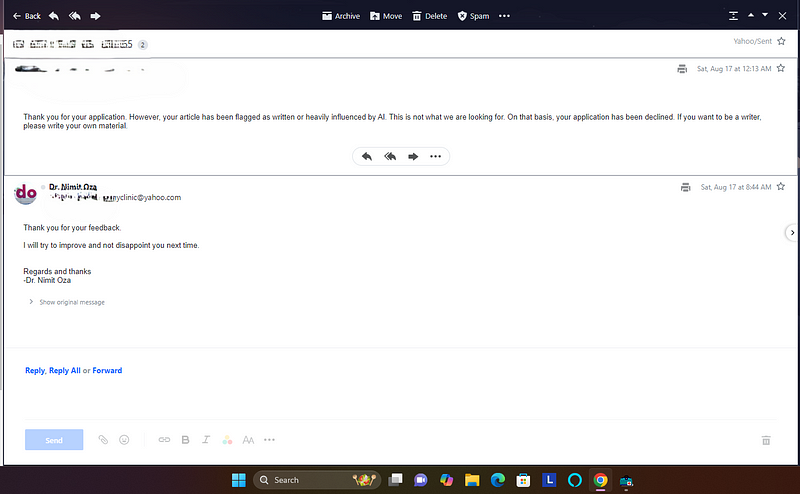The Double-Edged Sword of AI Writing: A Cautionary Tale
Written on
Chapter 1: The Allure of AI Writing
Embarking on this topic requires courage, as writing often reveals our vulnerabilities. Let me share a personal experience that highlights my mistakes.
Having been an avid reader on Medium since 2019, I have drawn immense value from the diverse voices on the platform, which have contributed to my personal growth. Initially, I never envisioned making money through writing; as an Indian author, I was unable to join the Medium Partner Program (MPP) and instead paid for a subscription to continue enjoying the content. To me, investing in reading was invaluable.
“There is no more profitable investment than investing in yourself. It is the best investment you can make; you can never go wrong with it. It is the true way to improve yourself to be the best version of you and lets you be able to best serve those around you.”
— Roy T. Bennett
Then one day, I learned that Indian writers could finally join the MPP. I was overjoyed at the prospect of earning through my writing! Although I had a decade of experience and had published 18 books in my native language, writing in English felt like a new frontier.
Entering the Medium paywall was both thrilling and daunting. With only 300 followers, I faced the challenge of finding the right publication. Lacking experience, I was unaware of the submission guidelines and was eager to start earning quickly. Despite having written several articles, the publications were seeking original drafts.
After five long years, I was anxious to begin. As Dante Alighieri wisely noted, “The wisest are the most annoyed at the loss of time.” As a urologist, my time was limited, and I decided to take a shortcut. Desperate to see the dollar sign next to my stories, I turned to ChatGPT for help.
In an instant, AI generated a compelling article for me. I was astounded by its speed, coherence, and choice of words. I felt as though I had received help with my homework, and I began to dream of limitless earning potential. If writing could be this effortless, why would anyone pursue traditional employment? I thought, “This is the breakthrough I’ve been waiting for.”
What I failed to realize was that while the entrepreneur within me was thrilled, the writer was suffering. I brushed aside my ethical concerns and submitted the AI-generated piece to a publication, eagerly anticipating acceptance and financial reward. However, I received a disappointing response.

Their message read, “Thank you for your application. However, your article has been flagged as written or heavily influenced by AI. This is not what we are looking for. Based on this, your application has been declined. If you wish to be a writer, please submit your own material.”
This was a wake-up call. I responded, “Thank you for your feedback. I will strive to improve and not disappoint you next time.”
Section 1.1: The Illusion of AI's Capabilities
In my eagerness, I overlooked a critical truth: AI can generate text but cannot convey genuine emotion. Writing is a powerful exchange of energy, and both editors and readers can sense a lack of authenticity. AI lacks the human ability to understand context, which is essential for meaningful communication.
Writing is fundamentally about forming a connection with the audience. A machine cannot replicate the emotional depth that a human writer brings to their work. While AI can organize and enhance language, it cannot create the magic that comes from a heartfelt narrative.
I recognized that, similar to my profession in medicine, I could not replace the human touch in writing.
“Writing isn’t about getting there. It is about who you become along the way.”
AI-generated writing led me to feel foolish because I placed too much trust in it. I forgot that while AI can mimic human language, it cannot replicate human emotion. Crafting a story involves significant rewriting and editing, something AI cannot execute effectively due to its lack of insight.
“Androids with Artificial Intelligence have no heart or soul. They will make our perfect masters.”
— A.R. Merrydew
AI writing made me look foolish because I treated it as a substitute for my creativity. My unique voice, style, and emotions are what set my writing apart. While AI may produce text that is grammatically correct and fluent, it lacks the connective power found in my authentic writing.
Although I can utilize AI for brainstorming and research, the actual writing process is irreplaceable. I eventually submitted my original work, free from AI influence, and it was accepted.
Section 1.2: Rediscovering My Voice
Through this experience, I learned that despite my imperfections, I am a better writer than AI.
Chapter 2: Lessons Learned
Why AI Isn't as Good at Writing as You Think
In this video, we explore the limitations of AI in creative writing, discussing why it cannot fully replace the human touch in storytelling.
Ok Fine, Let's Talk About "AI Writing"
This video delves into the implications of AI in writing, encouraging a balanced perspective on its use in the creative process.